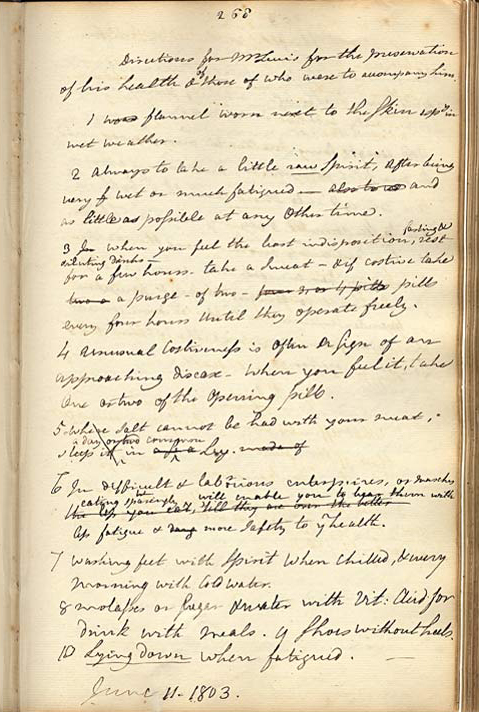In Philadelphia, Dr. Benjamin Rush writes eleven rules of health for Meriwether Lewis to follow on the expedition. He recommends purging, wearing flannel, moderation in eating and drinking of alcohol, and taking good care of the feet.
Rush’s Health Hints for Lewis
To see the text, point to the image.
American Philosophical Society, Philadelphia
Above is a page from Rush’s “commonplace book”—a blank book in which notes, reflections, quotes, or other matters of importance were written down and perhaps organized for easy reference.[1]Available in George W. Corner, ed., The Autobiography of Benjamin Rush: His “Travels Through Life” together with his Commonplace Book for 1789–1813 (Princeton, 1948), 267. The original … Continue reading Rush may have used this page as a reminder during his conversations with Lewis in 1803, or may have given him a clean copy of it. This version of his directions, as printed in Donald Jackson’s Letters of the Lewis and Clark Expedition (No. 43, 1:54-55), is believed to be Jefferson’s copy of Rush’s original.
June 11, 1803
Dr. Rush to Capt. Lewis for preserving his health.
1. When you feel the least indisposition, do not attempt to overcome it by labour or marching. Rest in a horizontal posture. Also fasting and diluting drinks for a day or two will generally prevent an attack of fever. To these preventatives of disease may be added a gentle sweat obtained by warm drinks, or gently opening the bowels by means of one, two or more of the purging pills [Rush’s Bilious Pills].
2. Unusual costiveness [constipation] is often a sign of approaching disease. When you feel it take one or more of the purging pills.
3. Want of appetite is likewise a sign of approaching indisposition. It should be obviated by the same remedy.
4. In difficult & laborious enterprises & marches, eating sparingly will enable you to bear them with less fatigue & less danger to your health.
5. Flannel should be worn constantly next to the skin, especially in wet weather.
6. The less spirit you use the better. After being wetted or much fatigued, or long exposed to the night air, it should be taken in an undiluted state. 3 tablespoonfuls taken in this way will be more useful in preventing sickness, than half a pint mixed with water.
7. Molasses or sugar & water with a few drops of the acid of vitriol will make a pleasant & wholesome drink with your meals.
8. After having had your feet much chilled, it will be useful to wash them with a little spirit.
9. Washing the feet every morning in cold water, will conduce very much to fortify them against the action of the cold.
10. After long marches, or much fatigue from any cause, you will be more refreshed by lying down in a horizontal posture for two hours, than by resting a much longer time in any other position of the body.
11. Shoes made without heels, by affording equal action to all the muscles of the legs, will enable you to march with less fatigue, than shoes made in the ordinary way.[2]From a copy in Jefferson’s hand. “Rush’s Directions to Meriwether Lewis for Preserving Health, 11 June 1803,” Founders Online, National Archives, … Continue reading
Experience the Lewis and Clark Trail
The Lewis and Clark Trail Experience—our sister site at lewisandclark.travel—connects the world to people and places on the Lewis and Clark Trail.
Plan a trip related to June 11, 1803:

Notes
| ↑1 | Available in George W. Corner, ed., The Autobiography of Benjamin Rush: His “Travels Through Life” together with his Commonplace Book for 1789–1813 (Princeton, 1948), 267. The original manuscript has never been found. |
|---|---|
| ↑2 | From a copy in Jefferson’s hand. “Rush’s Directions to Meriwether Lewis for Preserving Health, 11 June 1803,” Founders Online, National Archives, founders.archives.gov/documents/Jefferson/01-40-02-0396-0002 accessed 8 June 2022. [Original source: The Papers of Thomas Jefferson, vol. 40, 4 March–10 July 1803, ed. Barbara B. Oberg. Princeton: Princeton University Press, 2013, pp. 530–531.] The list in Jefferson’s papers is likely a copy of the list given to Lewis; whatever was given to Lewis is lost. Another, less-polished list is found in Rush’s Commonplace Book held at the American Philosophical Society in Philadelphia. It includes one suggestion edited from Jefferson’s copy: to salt food or steep it in lye—another dietary, preventive measure. |

